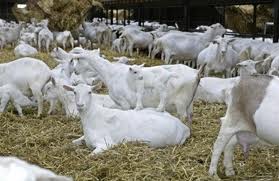Characterization of jamunapari goat in mahoba district of bundelkhand region
Keywords:
Breed characteristics, Habitat, Jamunapari, Management practiceAbstract
The present study was carried out in 50 flocks consisting of 484 goat in 10 villages randomly selected from the breeding tract to characterize and evaluate jamunapari goat under field conditions during the period from 2011 to 2012. The data on various goat management practices viz. breeding, feeding, flock size, housing, disease, etc. were collected based on personal observation and information provided by the farmers. The body weight and different body measurements namely horn length, ear length, ear width, tail length, withers height, chest girth, body girth, hip height and body length were taken. The animals are found to be large in size with well built body having a broad and deep chest. Most of the animals are white with tan or black markings at neck and ears. The flock size varies from 5 to 35. The main breeding season is September and March. The horns are short and flat sized and about 10–15 cm long, horizontal twisting backward and present in both sex. The ears are long and pendulous and about 25-28 cm long, the tail is medium in length. The mean body weights in age groups of 0–3, 3–6, 6–12 and >12 months of males were 9.16, 15.32, 21.64 and 28.89 kg, respectively, and they were 7.98, 13.08, 19.59 and 26.23 kg, respectively, in females. The animals have excellent feed conversion efficiency under extreme conditions with a high dressing percentage. Goat farming forms a major source of livelihood for the farmers of the study area and the non availability of good quality fodder was the major constraint in the farming system. The results of the present study revealed that there is a scope for increasing the productivity of this breed.
References
Ekambaram, B., Gupta, B.R., Prakash Gnana, M., Sudhaker, K., Reddy, V.R., 2011. Housing,breeding and
management practices of Mahabubnagar goats. Indian J. Anim. Sci., 81(8), 875-879.
Hassan, M.R., Talukder, M.A.I., Sultana, S., 2010. Evaluation of the production characteristics of the
Jamunapari goat and its adaptability to farm conditions in Bangladesh. Bangladesh Veter., 27(1), 26 – 35.
Nath, I., Chawla, D.S., 1978. A study on birth weight of Beetal, Alpine and Beetal x exotic crossbred kids.
Indian Veter. J., 55, 306-309.

Published
How to Cite
Issue
Section
Copyright (c) 2014 Sudhir Kumar Rawat, Shubhas Chandra Singh

This work is licensed under a Creative Commons Attribution-NonCommercial-NoDerivatives 4.0 International License.



